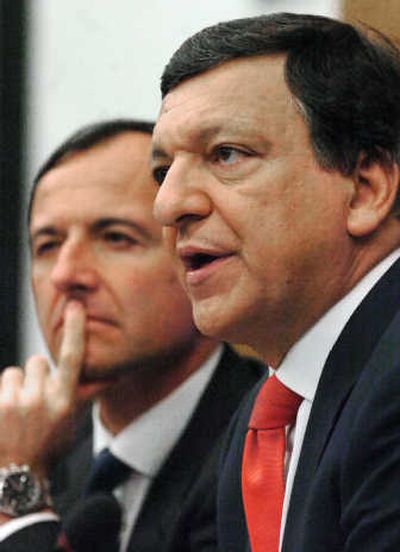EU seeks reform of worker visas

BRUSSELS, Belgium – Help Wanted: Nurses, doctors, engineers. Must be willing to live in Paris, Rome, Frankfurt or Prague.
The European Union unveiled plans Tuesday to launch Europe’s biggest global job advertising blitz and set up a visa program to lure skilled workers to fill increasing gaps across the 27-nation bloc.
European Commission President Jose Manuel Barroso urged governments to back plans to set up a Europe-wide fast-track “Blue Card” worker visa program – similar to the U.S. Green Card – to boost the influx of much-needed skilled labor.
“Highly skilled migrants are welcome in the EU,” Barroso told reporters at the European Parliament in Strasbourg, France, adding that taking in highly skilled workers would boost Europe’s competitiveness in the global economy and help retain top companies.
Barroso acknowledged that current efforts to keep and attract professionals from abroad “are not good enough,” adding it was “absurd” that the EU still had national immigration policies while it promoted a single market for jobs, goods and services.
He said the visa plan would offer highly qualified job seekers a simpler way to get a job within the EU and, if approved by EU governments, would do away with about 20 different complex national procedures to get residence and work permits.
The measures would seek to lure professionals from Asia, Africa and Latin America to work and live in the European Union through a new “one-stop-shop” visa application program, that would seek to process applications in between 30 and 90 days.
Franco Frattini, EU commissioner in charge of immigration issues, said the “Blue Card” plan would be similar to the U.S. system, but would not offer permanent legal rights to stay in the EU.
He said the EU at the moment was way behind other Western nations and economic rivals in attracting skilled labor.
“We want Europe to become at least as attractive as favorite migration destinations such as Australia, Canada and the USA,” Frattini said. “We have to make highly skilled workers change their perception of Europe’s labor market.”
Frattini pointed to EU statistics that showed that non-EU highly qualified workers accounted for only 0.9 percent of all workers in the EU, compared with 9.9 percent in Australia, 7.3 percent in Canada and 3.5 percent in the U.S.
“These figures show very clearly that, for the highly skilled workers, Europe is not very attractive and this is the reason why we have decided to launch this proposal, that I am sure is going to make the European Union somewhat more attractive,” he said.
The EU justice and interior affairs chief has been drafting his “Blue Card” plan for the past three years, but has faced opposition from many EU governments who do not want Brussels to set standards as to how many or what kind of immigrants they let into their countries.
Under the plan, migrants would be able to use a fast-track application asking for a single work and residence permit which would be valid for a renewable two-year work visa. Those who get the “Blue Card” would have the right to social and other employment benefits enjoyed by EU citizens and would, after an initial two-year freeze, be able to move to another EU state if they find a job there.
It would be left up to national authorities to decide how many EU work visas to issue under the plan, Frattini said.